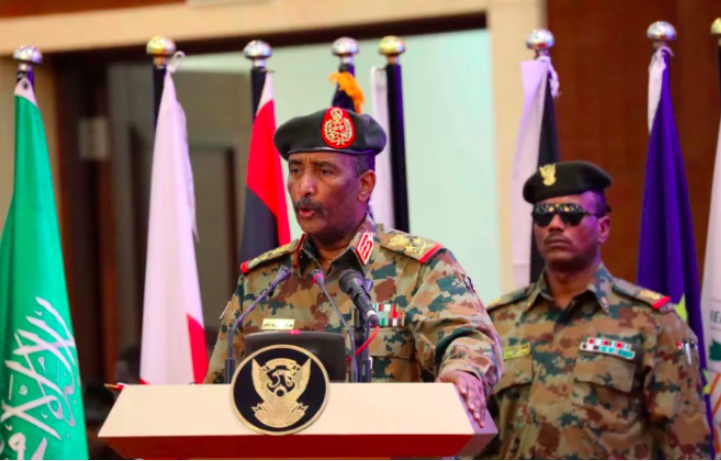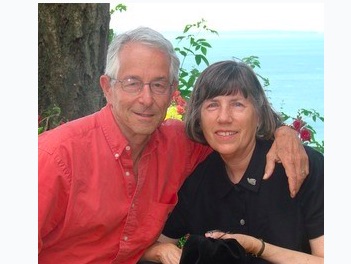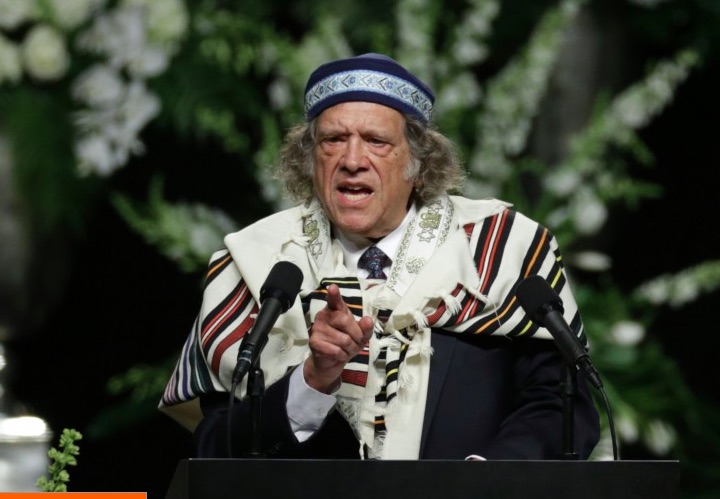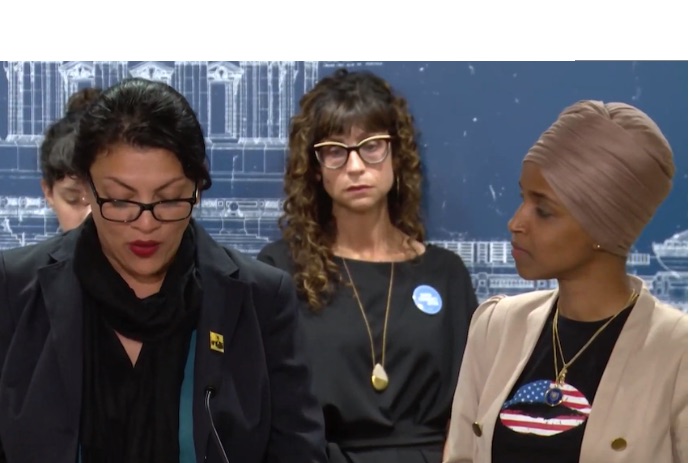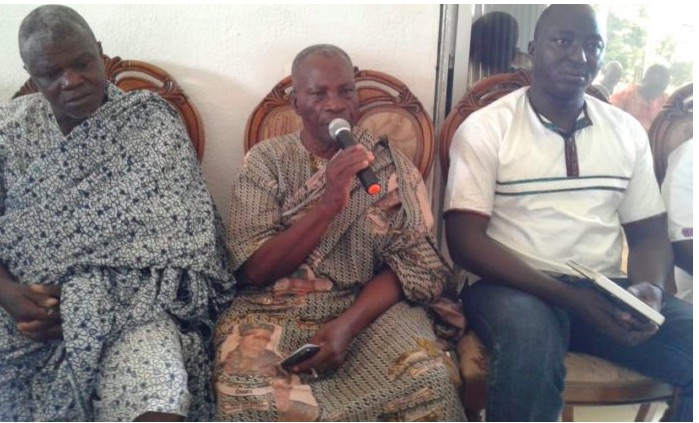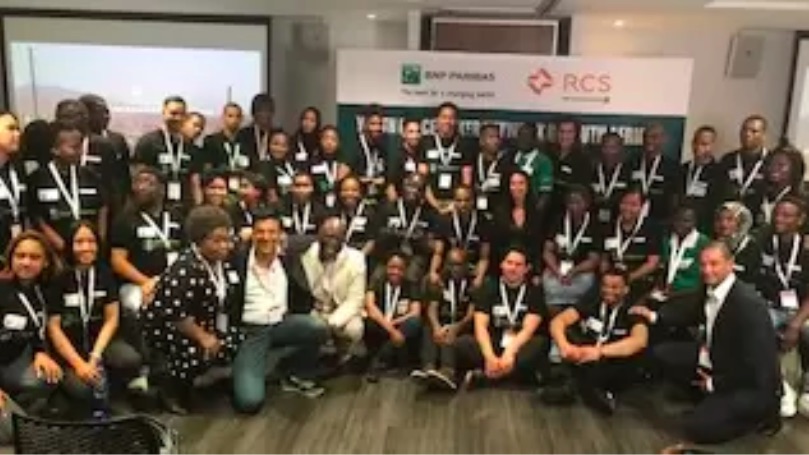TOLERANCE AND SOLIDARITY .
Excerpts from an article by Yehezkel Landau* in Tikkun (abbreviated by CPNN)
. . . The decades-long war between Zionism and Palestinian nationalism (each with secular and religious articulations) has pitted two national stories of heroic striving against each other, competing for validation. This zero-sum equation is shared by the majority of both Israelis and Palestinians who experience the conflict from within. But a fair-minded observer, especially one who wishes to promote inclusive justice and reconciliation, should be able to adopt a dual- or multi-narrative perspective and see the conflict as a profound tragedy rather than a dualistic morality play. The conflict is often seen as one of villains against victims, or oppressors against the oppressed; such a judgmental outlook favoring one side over the other contributes to the ongoing strife and to the widespread suffering that it creates.
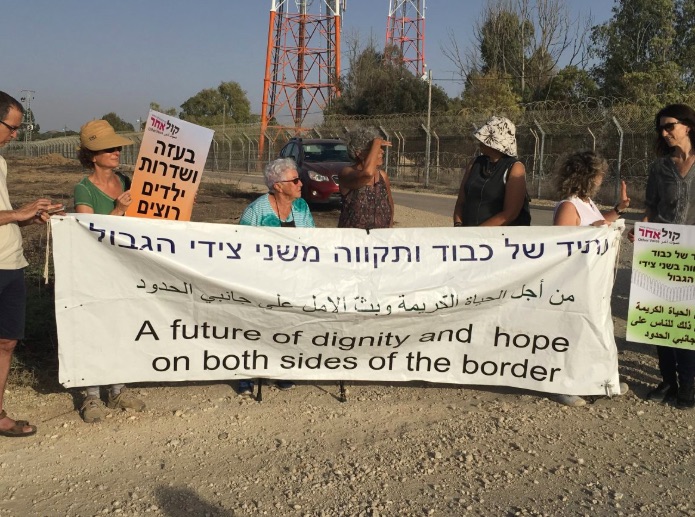 Protest from Israeli side of Gaza border with Israelis, Palestinians, and foreigners. Image by Cat Zavis.
Protest from Israeli side of Gaza border with Israelis, Palestinians, and foreigners. Image by Cat Zavis.
In my own approach to the conflict, I am adopting Hegel’s definition of tragedy: a clash between two rights, not right versus wrong. In this case, it is also a case of two peoples with painful histories forced to confront each other as they seek to be separately and mutually healed, but so far inflicting more traumatizing wounds on each other. The horrors of the Holocaust, on the Jewish side, and the searing trauma of the Naqba for the Palestinians, only deepened the tragic dimension of the conflict. The Palestinians’ national identity crystallized in the process of resisting Zionism and the influx of Jews into Mandatory Palestine after World War I.[15] And just as there are various forms of Zionism, Palestinian nationalism has exhibited a range of positions (e.g., Islamist or secular, Marxist-Leninist, or democratic). The common denominator on the Palestinian side is to view Zionism as illegitimate and immoral.
The perception of Zionism as an unjust, oppressive, colonialist ideology, demonstrated in practice by the expulsion and dispossession of a large part of the Palestinian people from their homes, fields, and orchards, would probably have been mitigated had more Jews been living in the land before the Zionist movement began. Since most of world Jewry was living outside Eretz Yisrael, and most Palestinians did not perceive Diaspora Jews as a nation but, instead, saw them as a religious community akin to Christians or Muslims, the Zionist claim to even part of Palestine seemed bogus, even fabricated. Had there been appreciable numbers of Jewish residents outside the four cities of Jerusalem, Hebron, Tiberias, and Safed—recall that Tel Aviv was inaugurated in 1909 and over time came to engulf the ancient city of Jaffa—then the conflict between Jews and Arabs in the land would have looked more like the Hindu-Muslim intercommunal strife on the Indian subcontinent that gave birth to the separate states of India and Pakistan. (Pakistan later devolved into two separate states, with Bangladesh breaking off from West Pakistan). Even in South Asia, at the same time that the Jewish-Palestinian conflict reached its explosive climax in the late 1940s, the implementation of an agreed-upon partition was accompanied by large-scale intercommunal violence.
There have been many ironic twists during the course of this tragic conflict. One is the role reversal that transpired between 1947 and 1988. When the Palestinian Arabs were the demographic majority, they did all they could to prevent a Jewish state from emerging in even part of Palestine. The Zionist leadership, for its part, accepted the United Nations partition resolution of November 29, 1947. Then, when the Jews were the empowered majority, they joined with Egypt and Jordan to deny Palestinians an independent state in the occupied West Bank and Gaza. It was only in 1988 that the Palestine National Council under Yasir Arafat’s leadership, meeting in Algiers, accepted the 1947 partition plan. But by then the Israeli Prime Minister was Yitzhak Shamir, who had always rejected any form of territorial partition. It took the election of Yitzhak Rabin in 1992 to launch the negotiations that produced the Oslo Accords. Another irony has been that, over the course of the last century, the two peoples have experienced complementary transformations in both symbolism and practice. For the Jews, the Zionist enterprise transformed a symbolic homeland suffused with dreams of messianic return from exile (see Psalms 137 and 126), but with very few geographical coordinates outside the aforementioned “holy” cities, into a functioning state with localized reference points. Some of those cities, towns, kibbutzim, and moshavim had ancient Biblical names like Beersheva or Ashkelon. Others were new creations, some with poetic names like Petach Tikvah, Rishon LeZion, or Tel Aviv, while others were development towns built later for immigrants, primarily from Arab countries, with names like Sderot and Carmiel. For the Palestinians, the process was reversed. Most of them began the 20th century with identities centered on their clan-based ancestral villages, which they retained even in exile. Over time these localized identities were supplemented by a collective sense of distinct peoplehood, as Palestinian national consciousness evolved. Now both peoples have dual identities, each combining an umbrella-like nationality that is reinforced by a shared narrative and symbolism, together with a sense of rootedness in a particular locale and community.
SEEKING A JUST PEACE
If we return to the moral dilemma at the heart of this conflict, we are faced with the challenge of finding a single standard of justice that can be the basis of genuine peace. To the extent that Zionism and Palestinian nationalism are conceived and lived out as self-referencing ideologies creating exclusivist identities, they remain impediments to reconciliation. And as long as that remains the case, the liberating vision of the Zionist pioneers will be even more corrupted, in both its ends and means, than it already is. Is there a redeeming alternative? I submit that if both Zionism and Palestinian nationalism can be viewed through more wide-angled lenses, they might yet become complementary rather than mutually exclusive. In that way, polarized psyches, hearts, and spirits can mutually nourish each other; they need not be seen as inherently hostile. As history has shown, shifts in consciousness need to occur in order for there to be shifts in behavior.
Zionism, in all its variations, has always had two aspects. One is the physical aspect rooted in, and driven by, an existential Jewish need for safety and security through an independent state with armed forces for self-defense. In the wake of the Holocaust, this aspect has been given disproportionate emphasis. The second aspect of Zionism, at least as vital as the first, is the metaphysical aspect, the longing for belonging rather than alienation, the yearning to be free and to feel at home, the psychological and spiritual need for independent selfhood that is not a defensive reaction to the harmful intentions of others. Jews, as human beings, deserve both security and spiritual liberation. So do Palestinians. A compassionate and just peace process based on mutual acknowledgement of those common human rights, needs, and aspirations can yield the practical fruits of reconciliation. That process would have as litmus tests three very practical criteria, based on emotional investments that can be changed if leaders choose to guide their communities away from antagonism and toward partnership: (1) Is fear being transformed to trust? (2) Is anger being transformed to mutual acceptance and forgiveness? and (3) Is grief being transformed by empathy into compassion for the suffering of others, before the grief turns into grievance and the desire for vengeance, fueled by bitterness and rage?
The national anthem of Israel is Hatikvah, “The Hope.” It expresses the yearning of Jews for Zion and the willful determination to be, once again, a free people in the ancient homeland. This two-thousand-year-old hope was never lost, the song proclaims. Zionism, in whatever form, is the practical expression of this hope. But the Zionist revolution will not be complete, or truly fulfilled, so long as Israelis feel threatened by their neighbors, which means that the Palestinian people need to have its own hope of return and freedom fulfilled also. The Palestinian national anthem, Biladi, Biladi, “My Homeland, My Homeland,” expresses the love and longing for the Palestine that was lost but not forgotten. How to honor and realize both hopes, both dreams of return and renewal, remains the supreme challenge for anyone who cares about this tragedy and its global ramifications.
(Article continued in the right column)
Question for this article
How can a culture of peace be established in the Middle East?
(Article continued from the left column)
The Israeli-Palestinian conflict is not simply over a common homeland and who exercises political control over it. At a deeper level, it is also about personal and collective identities that have developed in mutual antagonism rather than complementary creativity. In order to transform the political and spiritual dynamic from opposing struggles for independence to a common struggle for interdependence based on equity, the two national anthems need to be supplemented by other songs. Those additional songs need to put the collective yearnings for freedom and security within a wider context, one that frees both peoples from the shackles of alienation, existential dread, and recrimination.
One common goal that can help Israelis and Palestinians transcend their myopic notions of what best serves their interests is a shared commitment to safeguarding the land which they share from ecological calamities. In this regard, I think of a conversation I had with the famous anthropologist Margaret Mead several decades ago. We were talking about the Middle East, at a time when her daughter was living in Iran. Dr. Mead lamented the emphasis throughout the region on control over territory, based on strong attachments to a particular land, at the expense of environmental concerns about shared air and water. The shift in consciousness she was advocating could be a powerful force for shifting the bilateral focus on Israel/Palestine to a wider, regional perspective. There are already some commendable joint initiatives, like the Arava Institute at Kibbutz Qetura in southern Israel, that bring together Israelis, Palestinians, and Jordanians to work together on ecological sustainability. There are also hopeful signs of a growing environmental awareness among both Jews and Arabs. For example, on March 29, 2019, an annual Climate March was held in Tel Aviv. When it was first organized five years ago, some 200 people took part. This year over 5,000 people marched, Palestinian and Jewish citizens from all over Israel. They carried banners proclaiming mutual solidarity in the face of environmental threats and the need to work together to ensure a common future.
We need more signs of hope like these to boost our spirits and motivate action, within our respective communities and across boundaries. As a long-time grassroots activist in the arena of Jewish-Arab peacebuilding, I am confident that, over time, these micro-models of mutuality and solidarity will impact the macro-political situation. And one of the blessed fruits of these labors will be a conversion of hearts and an expansion of minds, so that Israeli and Palestinian national identities will be experienced as mutually enriching rather than as mutually exclusive and threatening. Let us all work toward that day and that outcome.
POSTSCRIPT: As I was writing this reflection, another round of lethal violence erupted between the Israeli government and the Hamas and Islamic Jihad leaderships in Gaza. The Egyptian government worked to bring about another cease-fire, while the underlying conditions that inflame passions and perpetuate the no-win state of war remain unaddressed. In 2008, during the first of three wars between Israel and Hamas over six years, I wrote the following appeal, which was disseminated through the internet:
IF ONLY…
An appeal addressed to Jews, Arabs, and concerned people everywhere
in response to the wars between Israel and Hamas
by Yehezkel Landau
If only our empathy and compassion were as strong as our capacity for self-justification;
If only we could protect ourselves in ways that do not inflict harm on others;
If only we could see ourselves as interdependent, rather than isolated and threatened;
If only we could see the Image of God in one another, rather than projecting mythic images of Arab Nazis or Jewish Crusaders;
If only our leaders were committed to transforming conflict nonviolently rather than too often using military means to achieve political aims;
If only peace education were a part of school curricula throughout Palestine and Israel;
If only political agreements outlawed incitement and demonization in public speeches;
If only the Israeli and Arab media conveyed multiple perspectives, along with humanizing stories and images, rather than reinforcing prejudices;
If only we could address the core issues and grievances, rather than reacting to the latest round of violence or the fear of further violence;
If only the Arab perception of the state of Israel (in its pre-1967 borders, with mutually accepted adjustments) was of a people coming home and exercising the right of self-determination, rather than of a colonial conquest by outsiders;
If only Arab and Muslim leaders could acknowledge the existential fears of the Jewish people following the Holocaust and reinforced by subsequent wars, bellicose rhetoric, and the prospect of weapons of mass destruction in the hands of Israel’s adversaries;
If only the Jewish people, in Israel and elsewhere, could acknowledge the deep, unhealed wound of the Palestinian people, displaced and dispossessed in large numbers in the war of 1948 and under prolonged occupation following the 1967 war;
If only Israel would join the Palestinian people in developing democratic institutions rather than destroying their civic infrastructure in the name of self-defense;
If only we could see the problem as a regional crisis, with multiple, interrelated challenges, rather than a bilateral conflict between Israelis and Palestinians;
If only a spiritual dimension to peacebuilding—drawing on the practical resources in Judaism, Islam, and Christianity—were included in Middle East diplomacy, so that religious extremists would be countered in their own terms and political arrangements would be grounded in mutual repentance, the healing of trauma, and sustained hope for the future;
If only we could envision a future of cooperation and shared blessing, rather than a no-win war lasting generations;
If only the children on “the other side” were as precious to us as our neighbors’ children;
If only our young people were exposed to their peers on “the other side” early on, so that they could build friendships that transcend the “us-vs.-them” dichotomy;
If only we could build Shalom/Salaam together, with a Jewish-Arab peace corps constructing homes, schools, and hospitals in a state of Palestine alongside Israel, and with expanded cross-border initiatives in the areas of health, education, culture, the environment, and sports;
…then perhaps, with God’s help and courageous leadership on all sides, both Israelis and Palestinians could experience genuine peace and security, with fear transformed to trust, anger to forgiveness, grief to compassion, and narrow self-interest to mutual solidarity.
Dr. Yehezkel Landau, a dual Israeli-American citizen, is an interfaith educator, trainer, consultant, and author active in Jewish-Christian-Muslim relations and Israeli-Palestinian peacebuilding for more than 35 years. While in Israel he was executive director of the Oz veShalom-Netivot Shalom religious peace movement and then co-founder and co-director of the Open House peace center in Ramle. From 2002 to 2016 he was a professor of Jewish tradition and interfaith relations at Hartford Seminary and holder of the Abrahamic Partnerships Chair.

